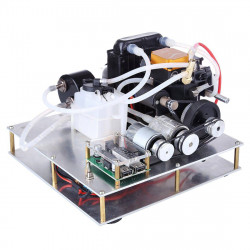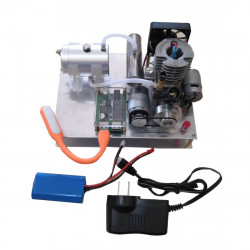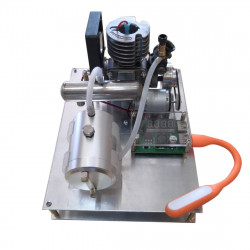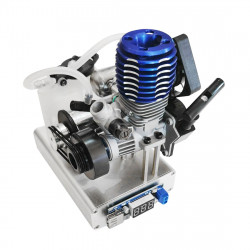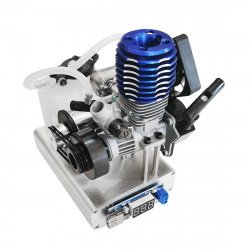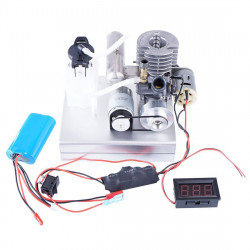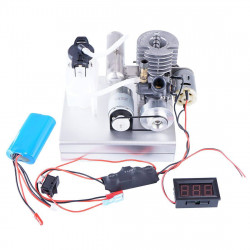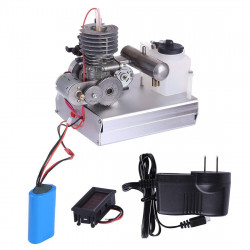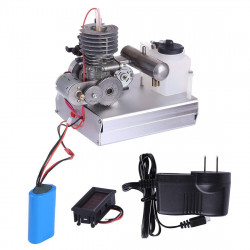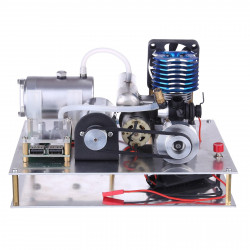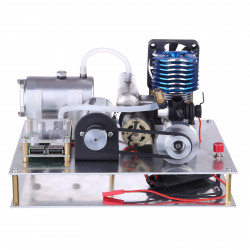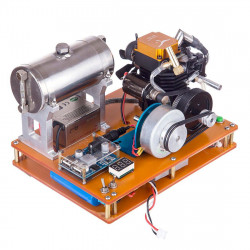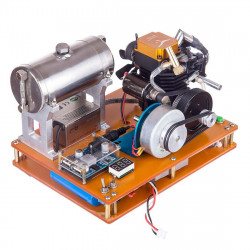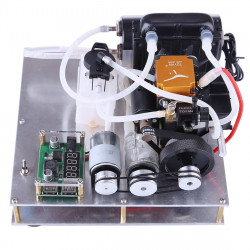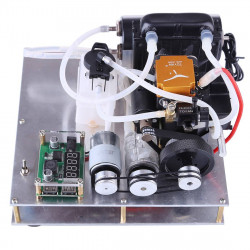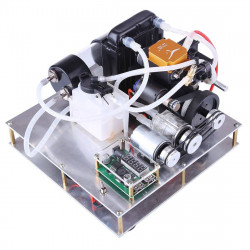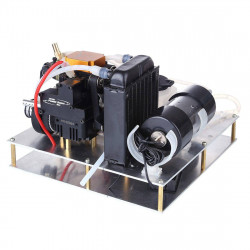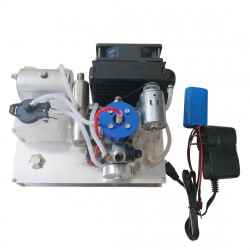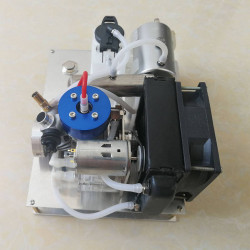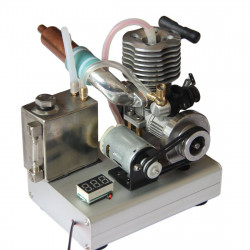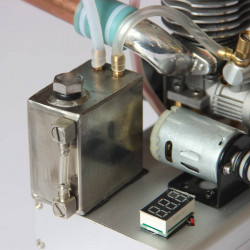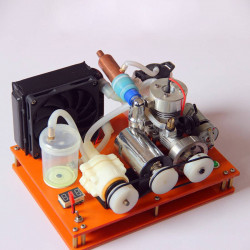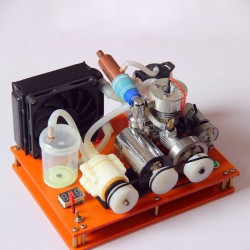Electric Generator: A basic introduction to how generators work, their features, and applications
How do electric generators work?
An electric generator is a machine that makes electricity. The electricity can be used right away or saved in batteries for later use in homes, businesses, and other places." The electromagnetic induction concept underpins the operation of electric generators.
A copper coil wrapped around a metal core is quickly spun between the poles of a horseshoe-shaped magnet." An armature consists of a conductor coil and its core. A mechanical energy source, such as a motor, has its armature attached to its shaft, which rotates it.
Engines can create the energy needed to run by using fuels like gasoline, diesel, or natural gas. Alternatively, renewable energy sources like solar, wind, or water power can also be used to produce this energy."
The coil's rotation breaks the magnetic field between the magnet's poles. An electric current will flow through the conductor because the magnetic field interferes with the electrons' movement.
Features of electric generators
Power: Many electric generators with varying power output capacities are easily accessible. Selecting the right electric generator is important. It should have the appropriate power capacity. This will ensure that you can easily meet both low and high power requirements.
Fuel: Electric generators can run on various fuels, including gasoline, diesel, LPG, and natural gas.
Portability: Wheels or handles allow generators sold in the market to move effortlessly from one location to another.
Noise: Certain generator types come equipped with technology that reduces noise, making it possible to keep them near each other without causing any issues with noise pollution.
Applications of electric generators
ElectricElectric generators are helpful for generators are helpful for residents, businesses, offices, etc., who experience frequent power outages. They serve as a fallback to guarantee that the appliances always have electricity.
Electric generators are the primary power source in remote locations where leading line energy is unavailable.
Electric generators can power tools or machinery on construction sites where access to the grid is restricted.
Best Electric Generator for Power Outages
Unexpectedly, severe weather might strike, knocking out the electricity for you and your family for hours or even days. An electric generator in preparation for these severe weather conditions will help you maintain electricity for your necessary electric appliances and gadgets. The number of items you wish to retain power will determine the size and kind of generator you need.
We will guide you through the many kinds and designs of generators to prepare you for any eventuality when your property has a power outage.
Choosing the right generator before the power goes out in your home
In the event of a power loss, there are three ways to maintain electricity in your home.
1. Portable Generator
Gas, diesel, or propane can be used as fuel for these generators. Depending on their size, they can be moved around quite simply due to their smaller size.
Pros
- Portable size
- It has an extensive range of sizes and prices to choose
- Most budget friendly
- Suitable for RVs, construction sites, camping, and hunting
- It has options for different fuel types
- It can be stored easily
Cons
- Have to have many cords running through it
- Needs refueled periodically
- Noisy
2. Standby Generator
Larger in size, standby generators are fixed to your house permanently. They are perfect for places where power outages occur often and for extended periods.
A certified plumber can connect the generator to the propane or natural gas line that runs into your house. The home is connected to the gas or propane line, so fuel will always be available. This eliminates the need for refueling, which will be pretty beneficial in a significant storm.
The standby generator will be connected to the house's breaker panel. This means there is no need to run electrical wires from the generator to the house. A licensed electrician is advised to connect the generator's wiring to your home's main breaker panel via a transfer switch. More extensive models of standby generators are available to power your entire house rather than just a few appliances.
Pros
- Larger wattage ratings
- Can power most or all of your home
- No cords to string out
- able to switch on either rapidly or automatically during a power outage
- No need to refuel
- Quieter than portable generators
- Stays outside
- No need to store it
Cons
- Higher cost
- Requires licensed professionals to install
- Not portable
3. Portable Power Station
A portable power station can offer a clean power source even though it's not regarded as a generator. They run on no fuel and, depending on their size, can run multiple appliances and devices for long periods. They can be used indoors because they emit no carbon monoxide.
Power stations have the disadvantage of needing a power source to replenish them when their power runs low. Solar panels are typically used for this when no alternative power source is available. They operate quietly and with excellent environmental friendliness.
Pros
- Environmentally friendly
- Zero carbon monoxide
- It can be used indoors
- Portable
- Budget-friendly
- No fossil fuels to operate
- Suitable for RVs, construction sites, camping, and hunting
Cons
- It has to be recharged when its power runs low
- Difficult to recharge during severe storms and power outages
How to determine the size of the generator that is needed
Make sure the generator is big enough for your needs by doing some calculations before selecting one to power your house in case of a power outage. You must know the power wattage needed to choose the appropriate size generator for your home, business, or leisure use.
Generators are sized and rated based on watts of power output. How you figure out the watt ratings will depend on what you intend to use your generator for. There are two sorts of ratings to consider: running watts and starting watts.
Electric motors in devices such as circular saws or refrigerators require starter watts to turn on. Running watts, also known as rated watts, are the constant watts required to maintain the operation of the device.
To determine your wattage requirements:
- List the items you'll need at the job site, in an RV, and in case of a power outage. Make a selection of the objects you want to use simultaneously.
- Write down the starting and running watts for every item. The appliance's data plate or owner's instructions contain these ratings.
- The RUNNING WATTS of all the appliances (that don't need starting watts) you want to run simultaneously should be added together. Add 1.5 to this number. This is the bare minimum generator size required.
- You will need to account for an extra step in your calculations if any appliances need to be turned on. The total RUNNING WATTS of all the devices you wish to run simultaneously should be added.
- To get your total running watts, find the gadget with the highest STARTING WATT rating and add that amount. Add 1.5 to this number. This is the bare minimum generator size needed.
Once you determine your power needs, you can compare various electric generators to find the best fit for you. This will help you choose the most suitable generator for your requirements.
Comparing different generators will allow you to select the one that meets your needs the most effectively. This process involves assessing how much power you need and then exploring different generator options. By understanding your power needs, you can select the most suitable electric generator for your specific requirements.
How to Build Your Own DIY Solar Generator?
You may reduce your electricity costs and have a portable backup power source in case of an emergency by building your own DIY solar generator. There has never been a better moment to make the switch to solar power due to the growing demand for renewable energy sources and the ongoing climate issues. You can discover how solar power works, take charge of your energy use, and lessen your carbon footprint by building your own generator. We'll walk you through the fundamentals of creating a solar generator in this blog post, including everything you'll need and how to do it. Make your own solar power generator and become energy independent!
What is a DIY Solar Generator?
A portable solar installation that combines all necessary parts into one self-contained device is called a solar generator. A solar generator combines everything for portability and convenience, in contrast to conventional solar installations where components are placed and installed individually.
As the name implies, a do-it-yourself solar generator is one that you construct yourself from easily accessible parts. With this method, you can alter the system to suit your own requirements and tastes. Assembling a DIY solar generator is similar to putting together a bespoke computer or bicycle: you choose and put together the parts to make a useful, customized solar power system. For this project to be effective and built efficiently, a great deal of planning and study are needed.
Benefits of Building Your Own Solar Generator
- No running costs:After installation, there are no continuous costs associated with using your solar generator. It uses free solar energy instead of gasoline like conventional generators do, which lowers utility costs.
- A green initiative: The construction of a solar generator encourages sustainability. By lowering your carbon footprint and dependency on fossil fuels, solar energy is clean and renewable, improving the health of the earth.
- Sense of accomplishment: Building your own solar generator is quite satisfying. It enables you to put your understanding of renewable energy and electronics to use. You feel proud and satisfied when you successfully build a working system because you know you've created something useful.
- Easy to repair: Comprehending the components of your solar generator facilitates troubleshooting and repairs. You may save time and money by maintaining and repairing your own setup because you are familiar with it, unlike commercial systems that need professional care.
Building your own solar generator offers energy independence, personal fulfillment, and environmental and practical advantages.
How to Build a Solar Generator?
The method of building a do-it-yourself solar generator involves several steps. We recommend viewing the easy-to-follow step-by-step video and following the directions below to ensure a successful build.
List of Parts and Components You'll Need:
- Solar Battery: The energy produced by the solar panels throughout the day is stored in the solar battery, which guarantees a steady power supply even in the absence of sunlight.
- Casing: In addition to making shipping and installation simple, the shell protects the solar generator's parts from physical harm and the elements.
- Solar Power Inverter: transforms solar-generated direct current (DC) electricity that is stored in the battery into alternating current (AC) electricity that may be used to power gadgets and appliances around the house.
- Solar Panels: These are the main parts that collect sunlight and use photovoltaic cells to turn it into electricity, which powers the solar generator.
- Solar Charge Controller: prevents overcharging, extends the battery's life, and maximizes energy efficiency by controlling the voltage and current flowing from the solar panels to the battery.
- Battery Maintainer: maintains the solar battery's capacity over time by controlling its charge and avoiding deep discharges, which guarantees the battery's best performance and longevity.
- DC Input: offers versatility in charging alternatives by enabling alternate charging techniques, such as connecting the solar generator to a DC power source like a portable solar panel or a car battery.
The Steps in Building Your Own DIY Solar Power Generator
1. Estimate Your Off-Grid Power Needs:
When you're off the grid, figure out how much electricity you'll need to run your appliances and gadgets, taking consumption duration and wattage into account.
You can use our amazing solar calculator for RVs if you're still unsure how to figure out how much energy you use each day.
2. Purchase a Solar Panel:
Purchase a solar panel that meets both your budget and your energy needs. Think about things like durability, efficiency, and wattage.
3. Buy a Battery and Battery Box:
To store the energy produced by your solar panel for later use, pick a deep cycle battery and an appropriate storage box.
4. Buy a DC Input:
To enable other charging options, including connecting your solar generator to a portable solar panel or vehicle battery, buy a DC input connector.
5. Invest in an Inverter:
Invest in an inverter that will transform your battery's DC power into AC power that can be used with household appliances.
6. Attach Meter and DC Input:
Connect to the DC input to enable a variety of charging methods, and attach a meter to track the performance of your solar generator.
7. Mount Your Components:
Place your solar panel where it will receive the most sunlight possible, and keep your battery, inverter, and other parts safe and secure in a waterproof enclosure.
8. Wire Everything Together:
Using the proper wiring and connectors, connect the solar panel, battery, inverter, meter, and DC input while adhering to manufacturer instructions and safety regulations.
9. Test the Parts:
Turn on your solar generator and check that every part is operating as it should. Verify the inverter's functionality, voltage output, and charging.
You may create your own DIY solar power generator by following these procedures, which will supply clean, renewable energy for your emergency or off-grid power requirements.
Buying vs. Building Your Solar-Powered Generator: Which Is More Affordable?
Think about your needs, financial situation, and level of experience when choosing between building or purchasing a solar-powered generator.
Buying a pre-built solar generator, such as the Lycan 5000 or Phoenix 1000, can be the best option if you value convenience and time savings. Seek out trustworthy companies that sell ready-to-use systems with characteristics like portability, various outlets, and battery storage. To guarantee dependability, look into warranties and customer feedback.
However, creating your own solar generator can be both affordable and adaptable. Determine your power needs first, then look for parts like inverters, solar panels, batteries, and charge controllers. Online guides and do-it-yourself kits can help you with the assembling procedure. For a collection of reasonably priced pre-configured parts, you might look at Renogy's solar kits.However, building necessitates time for study and construction as well as technical expertise.
To choose the best course of action, assess your abilities and the resources at your disposal. It might be easier to purchase a pre-made generator if you're new to solar energy or don't have technical know-how. On the other hand, creating your own generator might be satisfying if you like working on hands-on projects and want to customize the system to your preferences. In the end, a solar-powered generator provides dependable and sustainable backup power for off-grid or emergency situations, regardless of whether it is built or purchased.
Conclusion
Creating your own do-it-yourself solar generator provides practical skills, environmental advantages, and energy independence. You can build a personalized, portable power solution by choosing and putting together parts like solar panels, batteries, inverters, and charge controllers. Planning and study are necessary for this procedure, but the benefits—lower electricity costs, a less carbon footprint, and the fulfillment of building your own system—make it worthwhile. To take charge of your energy usage and help create a more sustainable future, begin your do-it-yourself solar generator project right now.
FAQs
How Many Solar Panels Do I Need to Power a Generator?
The wattage of your generator and your energy usage determine how many solar panels you'll need. A 300-watt generator typically requires one or two 100- to 200-watt solar panels. Determine based on panel efficiency and your power requirements.
Can I Build My Own Solar Power System?
It is possible to construct your own solar power system. It entails putting together charge controllers, inverters, batteries, and solar panels. You may design a unique and effective solar power solution with the right preparation, study, and safety measures.
